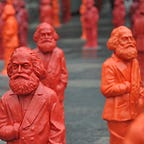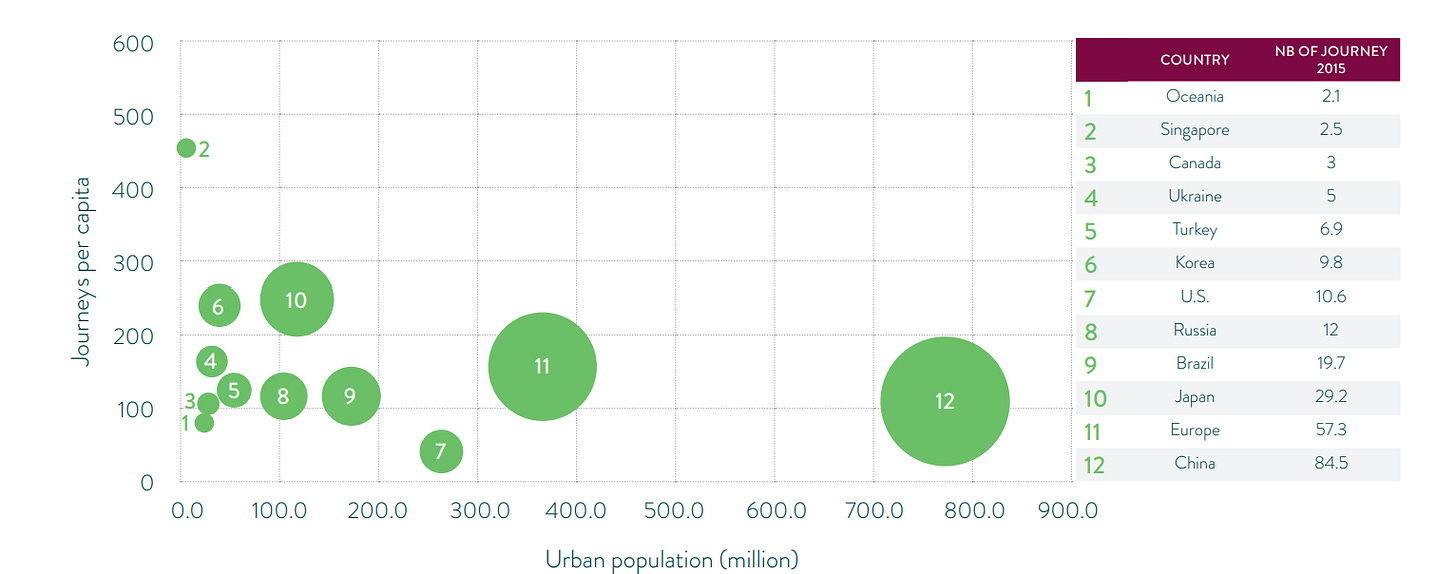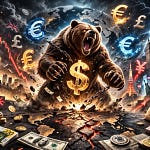Like many economists and investors working today, I learned that “the market” was an unthinking, unfeeling and unavoidable monolith that exerted its influence with powerful invisible hands. Behave appropriately, you reap benefits. Behave inappropriately, and Mr Market would punish you until you learnt your lesson. Or as James Carville supposedly quipped, he wanted to be resurrected as the bond market as you can intimidate anyone.
I have pretty much totally discarded that view. The reason the market was so powerful, was because voters wanted the market to be powerful, and governments to be weak. They had tired of the big government policies in the Post WWII period, and wanted free markets in charge rather than bureaucrats. I believe we are now at an inflection point, where voters favour less market, and more government. As part of this view, I suspect that gold will be a better store of value than treasuries. We have hit new cycle highs on this trade, but history suggests there is a way to go. Below is gold versus a treasury return index.
Even though I think a turn to “more government” is a world wide phenomenon, I have been thinking about what makes countries be more “socialist” in the first place? My first observation is that large scale war tends to make a nation’s politics skew left. Even the hardest nosed, flintiest hearted business person would struggle to argue that a returned and injured soldier was not deserving of some largesse from society. The presence of the “Bonus Army” in Washington, made up of returned World War I servicemen that had not found work during the Depression, was probably a strong factor in the election of FDR, easily the most left wing President the US has ever had. But FDR was elected in the period after World War I but before World War II. The US military swelled greatly during WWII, and stayed large during the cold war. The USSR power peaked in the early 1970s, with the schism between USSR and China. From there on the US has only faced limited military competition, and its politics has skewed to the right from 1980s onwards.
I suspect that just having a large army is not the sole determinant of a socialist trend. If the size of the armed forces, and military spending was the determinant of socialist trends, then the US would be more socialist than France or Canada, which is plainly not the case. I think a bigger determinant is whether a full scale war has been fought IN your country, not BY your country. When the entire population has suffered to some degree, then the chances of leftward move in politics seems elevated in my mind. Of course all of Europe suffered in World War II, while Continental USA was untouched. One thing I like about this line of thinking is that there is an interesting test case in Asia that proves the point. While Japan suffered two nuclear bombs at the end of World War II, there was no actual fighting on mainland Japan. In contrast, the Korean War which lasted from 1950 to 1953 saw the entire peninsula change hands at least twice. South Korea has also had to maintain a much larger standing army to counter the threat from North Korea. The implication is that Korea should be far more “socialist” than Japan. Korea has tended to have far stronger unions than Japan. Using OECD data, Japan has the least amount of strikes, while Korea is close to French levels. Korea has seen its minimum wage steadily rise, while Japanese wages have been stagnant. Korea has regularly seen left wing parties in power, while Japan has had only very limited experience with left wing governments.
My other theory on what makes a country socialist or capitalist probably only really applies to the US. One very distinct feature of the US is that it is built around the car. When we look at the cities of Europe and Asia, they were generally built on pre-car cities, and the cities needed to be adapted to needs of the car as it was introduced. In Europe and Asia, public transport was used to ease congestion.
This is not the case with the US, where most of the growth in cities occurred after the invention of the motor car. Certainly, Los Angeles and Miami do not feel like cities that are easily travelled by public transport. Outside of the big cities, it is very typical to find a chain restaurant located in the middle of a car park. Walking to the restaurant would be a very odd idea. In most of Europe and Asia, public transport tends to be cheap and efficient. In the US, it barely exists. A car culture really does allow someone to live and work in a bubble far away from the travails of your fellow citizen. Using data from the International Association of Public Transport, we can see how much of an outlier the US is in terms of public transport. Oceania (mainly Australia) is probably next closest, and I would argue Australian politics are somewhere between the US and Europe, as its use of public transport.
One interesting question with this analysis is that the US faces no threat of invasion from Russia or China, so there is no issue with that causing a leftward shift in US politics. And US car culture is fully embedded, and with the shift in population South and West, is structurally strengthening. So there would seem to be no structural shift left. But my argument is that leftish moves in the rest of the world forces the US to also shift left. It seems very likely that armed forces will be rebuilt in Western Europe. The question is whether we will see a rise in Armed Forces numbers in the US? I suspect that will need a shooting war with China to break out.
Instinctively the idea of Socialism needing armed combat to spread feels true. Eastern Europe and North Korea become socialist due to the occupying Russian army at the end of World War II, while the Chinese Communist Party had to defeat the KMT to turn China communist. As Chairman Mao said, power comes from a barrel of a gun. So the remoteness of the US, with no military competitors in either North or South America, combined with a strong car culture suggests that the US will always be more capitalist than anywhere in Europe or Asia. But I think there is a second order effect for the US. This analysis suggests that the rest of the world will turn more socialist, which in my view means that global inflation and interest rates will rise. Certainly long dated Japanese bond yields are pointing to a new world. Do bond yield move inversely to peacefulness in the world?
Many people think we should reduce income inequality. But does this only become politically possible in periods of conflict? Is this the ultimate trade off - war with social justice or peace with inequality? Probably.

















